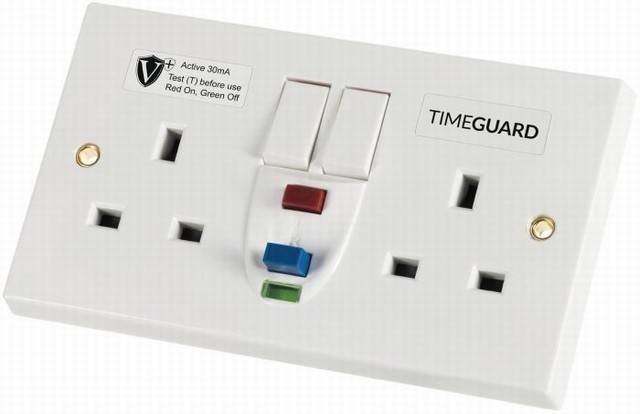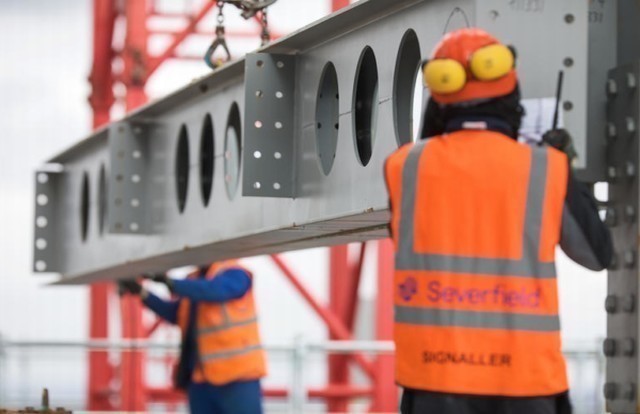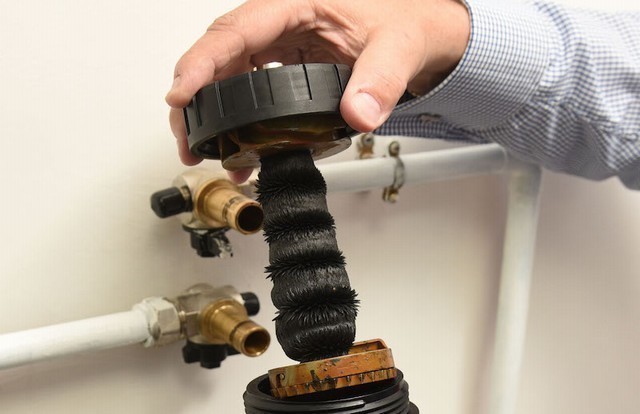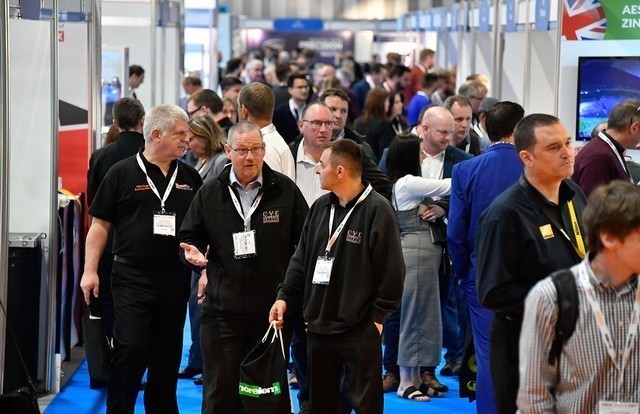June Newsletter 2019
June 2019 Newsletter
‘£40m growth for bathroom market in 2019, Plan to start £85m Eden Project North in 2020, £1bn Stratford East Bank scheme clears final planning, Visitor numbers soar at Subcon 2019, Water treatment should be considered at design stage.’
Quick Links
£40m growth for bathroom market in 2019
A new bathroom market report from MTW Research indicates that bathroom sales will grow by around £40 million in 2019.
Based on data from 130 bathroom suppliers, the report identifies rising ‘pent up demand’ in the bathroom market, highlighting growing latent demand for several sectors. Bathroom retailers are reporting healthy levels of enquiries according to MTW, but consumers remain reticent to commit to purchase due to Brexit paralysis and economic uncertainties.
Discussing the 200 page report, MTW director Mark Waddy said: “Strong fundamentals for the bathroom market are bubbling under the surface. 400,000 first time buyers in 2019, rising disposable incomes, consumers delaying bathroom refits for 3 years now, growth in experiential bathroom retailing and some great product innovation across the bathroom market are just some trends waiting to boost bathroom sales as soon as Brexit uncertainties are resolved.”
Whilst the report identifies a dwindling number of bathroom suppliers able to unlock these opportunities in 2019, a number of products are outperforming overall bathroom market sales. MTW identify a growing polarisation of the bathroom market, with higher value products underpinning optimism for bathroom retailers targeting the growth markets identified in the report.
The report also discusses key bathroom design trends with the bathroom’s evolution as a ‘retreat’ giving way to more multi-faceted demands from multi-generational and disabled households, changing lifestyles and design trends. MTW highlight myriad design trends supporting growth for bathroom manufacturers and retailers, including urban, luxury, industrial and geometric design trends; changing siting trends in the sanitaryware market, zoning in the bathroom furniture market; rising sophistication of the bathroom lighting market; shifting DIY market and mix and match trends in the brassware market.
Somewhat surprisingly, MTW found that the ‘Brexit effect’ may be starting to have a modest, positive impact for UK-based bathroom manufacturers. Bathroom retailers are becoming increasingly concerned about Brexit’s threat to bathroom imports, with some evidence of a shift to UK produced goods by higher value independent retailers as a result. This trend is modest at present according to MTW but is offering opportunities for UK bathroom manufacturers to use their ‘made in Britain’ credentials to add value and quell fears of supply chain disruption due to Brexit.
As well as identifying products outperforming the bathroom market, including the bathroom lighting market and higher value bathroom furniture market, the report also reviews bathroom distribution channel shares. The research found that share growth is slowing for online bathroom retailers in 2019. With MTW finding bathroom industry profitability slipping from 5% in 2017 to just 3% in 2019, average prices may have now troughed, with some online retailers repositioning to enhance margins. MTW point to wider evidence of shifting trends in internet retailing, with Amazon recently opening its first physical retail store.

£40m growth for bathroom market in 2019
Source: HPM Magazine
Is your RCD protection up to standard?
The latest British Standard for RCD protection has been in force for over two years, and it really is time to give your customers all the benefits of the latest thinking on their safety.
That’s where the new Timeguard Valiance+ range of RCD-protected switched sockets and spurs comes in. As usual, this trusted supplier has gone the extra mile and, as well as upgrading features to meet the new British Standard BS7288:2016, it has undertaken a complete redesign and upgraded to the latest generation of componentry throughout. So, both end-user safety and long-term reliability are improved.
The Valiance+ range of one-gang and two-gang RCD switched sockets in both active and passive versions is fully compliant with the new BS 7288:2016: Specification for residual current devices. This latest standard replaces BS 7288:1990.
The comprehensive range of RCD wiring accessories covers all you’ll need, including white plastic and rugged metal clad variants in both one-gang and two-gang, and a choice of three styles of RCD switched fuse spurs.
For further information, visit timeguard.com

Is your RCD protection up to standard?
Source: Electrical Contracting News
HSE inspections to target construction firm dust control practice
Firms across Great Britain are to be targeted in a new series of inspections focusing on dust control by the Health and Safety Executive (HSE), it has been announced today.
Over the next few weeks, HSE will be concentrating on industries such as construction where occupational lung diseases, including in some cases occupational cancers, are more common.
Inspectors will be visiting businesses across the country to see what measures have been put in place to protect workers’ lungs from the likes of asbestos, silica, wood, and flour dust. They will be looking for evidence of businesses and their workers knowing the risks, planning their work and using the right controls. Where necessary, HSE will use enforcement to make sure people are protected.
HSE’s Chief Medical Officer, Professor David Fishwick said: “Exposure to asbestos, silica, wood, flour and other dust can have life-changing consequences.
“Each year work-related lung diseases linked to past exposures are estimated to kill 12,000 workers across Great Britain. In many cases these diseases take a long time to develop after exposure, so the damage done may not be immediately obvious. Others, such as occupational asthma and acute silicosis, can occur more quickly.
“These conditions can and do have a significant impact on both the individuals affected and those closest to them, so it is imperative that workers take the necessary precautions to protect their lungs.”
Sarah Jardine, HSE’s Chief Inspector of Construction said:“We are carrying out this series of inspections to ensure businesses are fulfilling their legal duties to protect workers from harm. This includes controlling the levels of dust in workplaces.
“We want to ensure employers and their workers are aware of the risks associated with any task that produces dust. Such work needs to be properly planned and use the right controls, such as water suppression, extraction and masks.
“The bottom line is we want everyone, workers and their employers, to be protected from harm and ill health so they can go home healthy to their families.”

HSE inspections to target construction firm dust control practice
Source: HVP Magazine
Primary Engineer programme encourages young innovators
Midlands primary school pupils have been challenged with designing and building vehicles, with support from engineers at Schneider Electric.
Primary school pupils from ten schools across the Coventry and Warwick area will take part in a celebration event and competition on 11 June, hosted by Schneider Electric and Primary Engineer, to showcase the results of their hands-on experience of designing, building and styling their own electric vehicle.
The competition will task young innovators with testing their electric vehicles on ramps to test power and durability. The morning session offers an opportunity for pupils to demonstrate what they have learnt and how they built their vehicles.
With funding from Schneider Electric, teachers from the local schools attended a training session at the Coventry offices and were paired with Schneider Electric engineers in order to learn to deliver the school- based STEM activities. Each school was provided with comprehensive lesson plans and resources to construct eight vehicles per school. The Schneider Electric engineers visited the schools throughout the programme to provide pupils with support and to promote careers in engineering.
Part of the Primary Engineer programme is designed to break down stereotypes associated with the world of engineering. The competition offers the chance for school pupils to gain skills and competences and introduce a practical element into the curriculum for pupils at an early age.
The winning teams will be chosen based on the vehicle’s performance in the testing stage, its build quality, its design and control as well as awards for best design and best communicators. The winning teams will be awarded certificates and medals, with a comprehensive on-going support package from Schneider Electric.
Phil Moulden, support director of industrial automation at Schneider Electric said, “The UK faces a huge engineering skills shortage – and we need to do something about it. At Schneider Electric, we are passionate about helping to transition our young people from education to employment. This is why it’s vital that we provide the right training and offer exposure to the world of engineering from a young age. Only then can we ignite a passion for a potential future career in the industry. We chose to partner with Primary Engineer in the hope of supporting schools in STEM training and in widening the potential talent pool of the future.”
According to Chris Rochester, UK director, Primary Engineer, “Working with companies like Schneider Electric is a vital part of what we do. We are thrilled that Schneider Electric has been able to support us in impacting the lives of young people in the Coventry and Warwick area. Ultimately, we aim to inspire pupils and teachers alike through their professional development and through our competitions to spark a passion for a skilled and understaffed industry. We’re excited to judge the electric vehicles that these students have worked so hard on with the support of their teachers. Good luck to all participants.”

Primary Engineer programme encourages young innovators
Source: Electrical Review
Plan to start £85m Eden Project North in 2020
Details have been revealed of ambitious plans to build an £85m northern version of Cornwall’s Eden Project on Morecambe Bay’s seafront.
The first environmental scoping planning report for the proposed Eden Project North attraction has been submitted to Lancaster City Council.
Backed by Eden Project International, the project will consist of five mussel-shaped domes rising to nearly 40m.
These will offer 21st century re-imagined lidos, gardens, performance spaces, immersive experiences focused on the marine environment and observatories.
It is due to open in spring 2023, following a two-year construction period.
David Harland, chief executive of Eden Project International, said: “This is an important milestone for Eden Project North.
“Having a positive impact on the internationally significant environment of Morecambe Bay is fundamental to our vision for this project. This report is the next step towards making Eden Project North a reality.”
EPIL is working with Lancashire Enterprise Partnership, Lancaster University, Lancashire County Council and Lancaster City Council to deliver Eden Project North.
Each of these has contributed £250,000 towards the cost of designing and planning. This is in addition to £100,000 pledged by the Government.
The project has the support of Northern Powerhouse Minister Jake Berry MP, who has pledged to help Morecambe and Lunesdale MP David Morris lobby the Chancellor of the Exchequer for further funding.

Plan to start £85m Eden Project North in 2020
Source: Construction Enquirer
Severfield warns steelwork tender margins tightening
Britain’s biggest constructional steelwork contractor has warned that tender margins are tightening at its UK business.
The firm said that softer market conditions had created some spare fabrication capacity, although the firm said it had begun to see stirrings of more bidding activity in the London commercial market.
Reporting an 11% rise in pre-tax profit to £25m, Alan Dunsmore, chief executive officer, said that the impact of these UK market conditions was being eased by the re-emergence of the market in the Republic of Ireland and opportunities in continental Europe, where the firm has a fledgling Dutch business.
He added that Severfield was also pursuing infrastructure work opportunities for HS2 and the expansion of Heathrow airport.
“We also see good opportunities from the government’s ongoing Network Rail and Highways England investment programmes,” he added.
Revenue in the year to April was broadly flat year-on-year at £275m, mainly as a result of the softer UK market conditions and some project delays, to both contracts within the order book and in the conversion of our pipeline of opportunities.
This predominantly impacted volumes in 2019.
Dunsmore said that growth in operating margin to 8.5% (2018: 8.3%) reflected better risk and contract management processes at the firm.
The order book of £295m was up £65m on the half-year and contained a high proportion of lower risk, regional projects with shorter lead times.
It includes a £50m order for the new Google Headquarters, which will require over 15,000 tonnes of structural steelwork for the 11 storey head office building at Kings Cross.
Dunsmore added: “We remain on track to deliver on our strategic targets, including the doubling of underlying profit before tax to £26m by 2020 and we look forward to another positive year ahead.”

Severfield warns steelwork tender margins tightening
Source: Construction Enquirer
£1bn Stratford East Bank scheme clears final planning
Plans for the £1.1bn East Bank development on Stratford Waterfront at the Queen Elizabeth Olympic Park in London have cleared the final planning hurdle.
The 4.25-hectare site will be a new cultural and education centre in East London.
It will be home to major new buildings for the Sadler’s Wells dance theatre, the BBC, the Victoria and Albert Museum and a new campus for the University of London’s College of Fashion.
The mayor’s office also granted planning for around 600 new homes within a complex including a 27-storey landmark tower.
Mace is leading project and construction management of the commercial part of the scheme which is presently in advanced procurement.
The scheme has been designed by a collaborative team of Allies and Morrison, O’Donnell + Tuomey and Camps Felip Arquitectura.
PJ Careys has the £16m contract for substructure work on the site. Select Plant also was awarded a £5.4m contract for hire of six tower cranes on the job.
Speaking on behalf of all the East Bank partners, Lyn Garner, chief executive of the London Legacy Development Corporation, said: “This is a huge milestone for the project and testament to the hard work, and commitment of all those involved.
“East Bank will be the glue that binds together the different elements on the Park from world-class visitor attractions, high-tech business districts, thousands of new homes and wonderful parkland and open spaces.
“Now, with planning permission in place for the biggest and most exciting culture and education project for a generation, we can start to deliver on the promises for jobs, skills and homes for east London.”
The other parts of East Bank are UCL East, a pioneering new campus for UCL in the south of the Park and the V&A’s new Collection and Research Centre will be located at Here East in the north of the park.
Last year, the Mayor confirmed that at least 50 per cent of new homes across the remaining development sites on the Park – Stratford Waterfront, Pudding Mill and Rick Roberts Way – will be genuinely affordable.

£1bn Stratford East Bank scheme clears final planning
Source: Construction Enquirer
New standard requiring in-line filters welcomed
Following the recent publication of the new British Standard, BS 7593:2019, Adey has welcomed the new guidance, saying it will help drive the adoption of best practice in whole system health, not simply boiler protection.
The revised standard for the preparation, commissioning and maintenance of domestic heating and cooling water systems came into effect on 31 May 2019, superseding BS 7593:2006 which was immediately withdrawn. The standard now includes the following key changes for those specifying, installing and maintaining domestic heating and cooling systems:
- For the first time, the fitting of a permanent in-line filter is required in addition to a chemical clean and fresh water flush before inhibitor is added
- An in-line filter should be fitted to ALL systems
- All recommended cleaning methodologies can be improved with external magnetite capture equipment and mechanical vibration of radiators
- A water test is required to test the level of inhibitor and cleanliness of the system every year
- Inhibitor should be re-dosed every five years or a full system water test undertaken
- BS 7593:2019 is now applicable to both closed loop heating and cooling circuits
- Biocide is required in cooling and low temperature heating systems, and should be considered for higher temperature systems for added protection during downtime
- The changes aim to drive greater consideration for correct water treatment chemistry and filtration including prevention, maintenance and monitoring to properly protect a system for the long term.
Dr Neil Watson, Adey’s Chief Technical Officer, explains: “The changes made acknowledge that chemical water treatment isn’t a fit and forget solution, and magnetic filters shouldn’t just be considered a ‘nice to have’. Including these solutions in British Standard’s BS 7593 recognises a critical shift in moving the industry towards a holistic approach to system maintenance.
“A high proportion of boilers that fail in the first year do so because of poor water quality, so by introducing regular testing and redosing, proper system cleaning and the mandatory installation of an in-line filter to the industry’s code of practice, we can significantly improve the efficiency and life expectancy of every household system. This represents massive potential to contribute to the reduction of carbon emissions.”

New standard requiring in-line filters welcomed
Source: Pham News
Visitor numbers soar at Subcon 2019
Subcon 2019, the UK’s premier subcontract manufacturing supply chain show, has achieved a significant uplift in visitor numbers.
Over 4,100 manufacturing and engineering professionals attended this year’s event – which ran from 4 – 6th June at the NEC – marking a 16 per cent increase year on year and on par with the show’s record attendance achieved in 2017.
During this 43rd edition of the Show, visitors had a chance to meet, speak with and gain invaluable insight from more than 250 exhibitors and over 100 companies have already rebooked their stands for 2020.
A spokesperson from exhibitor Washington Metal Works said: “This was our first time at Subcon and only the second time we’ve ever exhibited, and it’s been really good. It’s really important for us to be able to speak to a lot of different industry sectors because of how diverse our customers are, and we’ve made some great connections that could translate into potential clients. We’ll definitely be back next year.”
Fellow exhibitor Bowman added: “Subcon was very good this year; the people who came to see us were very focused and of a high quality, so it’s been a successful show for us and we’ve already signed for next year, when we’ll have even more new things to show visitors.”
The Engineer Conference, which ran alongside the exhibition, provided over 30 high-powered free educational sessions, covering a wide range of topics including AI, robotics, nuclear fusion, hybrid aircraft and digitalisation. Speakers including Ian Warhurst, the Bloodhound Landspeed Record Project CEO, Brian Holliday, Managing Director for Siemens Digital Factory and Dave Short, Technology director with BAE Systems.
New features at Subcon 2019 included the Subcon Launchpad and Awards: a new start-up incubator designed to propel six embryonic businesses into the limelight. The winner of the very first Launchpad Award – winning a full sized-stand at next year’s event – is Elements Technology.
This year’s event also helped to celebrate the centenary of the Women’s Engineering Society, with a series of presentations from some of the UK’s leading women engineers including WES CEO Elizabeth Donnelly.
Under new ownership at Mark Allen Group, Subcon will return alongside The Engineer Expo to the NEC Birmingham in 2020 from 9-11 June. For more information, please visit www.subconshow.co.uk

Visitor numbers soar at Subcon 2019
Source: The Engineer
Water treatment should be considered at design stage
Andrews Water Heaters is advising specifiers to factor water treatment into the design stages of the hot water system to ensure peak system performance.
One year on from the publication of ICOM’s ‘Water quality consideration of domestic hot water systems for commercial applications’ document, David Ridgway, Product Application Manager at Andrews Water Heaters and contributor to the guide, argues that more could be done to account for water treatment prior to the installation and commissioning of a water heater.
David highlights that the long-term implications of not treating the water that the system uses could be financially damaging to the end user who must pay for non-routine repairs or replacements and increasing poor efficiency. Additionally, the specifier may be putting their reputation at stake by specifying the wrong appliance or water treatment device.
“Our industry has, at times, not paid close enough attention to the importance of water treatment. It is often an afterthought with best-practice treatment seen as a nice to have rather than a must have. This is in spite of poor water quality potentially resulting in energy wastage, reduced system performance, potential appliance health issues and the need for the early replacement of components. Failing to prevent or adequately control the treatment of the water could also result in the risk of exposure to legionella – exposing end-users to unnecessary risks,” David comments.
David says there are several considerations that must be made during the design stage that will impact the type of water treatment that is employed. For instance, the local water board should be contacted to provide specifiers with the data on the area’s water quality, the hardness of the water will dictate whether a softener or conditioner is required.
“Further consideration should be made to the issue of corrosion can occur in all systems. Some systems however, may require treatment dependent on the materials present. For example, the UK’s water distribution infrastructure still makes use of lead pipes in some areas, meaning that the local water authority could vary the dosing of phosphates in the water to protect lead pipe – impacting the performance of some appliances and devices”, David said.
Corrosion and many of the other challenges facing end-users can be controlled from the outset by adopting good system design and installing a water treatment device such as a water softener or a physical water conditioner. It is always advisable to consult with a water treatment specialist to ensure that the chosen device is compatible with the type of water heater, the make-up and the local water supply and the type of application (temperature and loading) being specified.
“Specifiers and manufacturers should work evermore closely together. Linkage at the design stage can help to ensure the chosen treatment device works to promote the longevity and health of the system. As an industry, we can maintain the life, efficiency and reliability of water systems by working together at the design stage,” David concludes.

Water treatment should be considered at design stage
Source: Pham News
New online portal seeks to increase communication
TrustMark, the Government-endorsed quality scheme for tradespeople, has announced the launch of a new business and consumer portal, providing a secure, free and convenient platform for businesses and their customers to communicate and be transparent with each other.
The portals, which are available on the TrustMark website, are part of TrustMark’s commitment to make it as easy as possible for consumers to find reputable tradespeople. They will also be strengthened with advice and guidance that supports the scheme’s code of conduct and customer charter.
TrustMark registered businesses and consumers will now be able to exchange messages, photographs, plans and any other relevant documents through the portal, keeping all communications in one convenient place. This method will ensure total clarity on both sides regarding the nature of the work agreed, costings, delivery dates and expected outcomes.
Consumers can now request a quote for work directly through their portal account. By doing so, each selected registered business will receive an email inviting them to log in to the TrustMark business portal, where they can view any new enquiries.
When quotations have been submitted in response to enquiries, the consumer will be notified through the portal and can accept or reject the quote, or request further information. Businesses will be able to see what enquiries are new or open at any time and will be immediately notified by email if the status of an enquiry changes, for example, if a quote is accepted or a question is asked. Once a quote has been accepted and a project is ongoing, either side can track progress and request info or record updates as and when required.
Registered businesses now have the option to personalise their profile on the TrustMark website, allowing them to add company logos, photographs of previous work and highlight areas of specialism and the locations they cover. Businesses using this service will also have access to a range of free template documents such as contracts and invoices
Simon Ayers, CEO of TrustMark, says, “The development of this new functionality of our website is part of our commitment to not only ease consumer access to reputable tradespeople, but to actively champion the businesses we know are doing the right thing. We believe this portal will make choosing to use a TrustMark registered business simpler than ever for consumers, and by making the quote request process as simple and barrier-free as possible, this will vastly increase the possibility of enquiries transforming into paying customers. We will retain our status as a not-for-profit social enterprise and have no intention to turn into a paid-for lead generation service – we simply want to provide a service that tangibly benefits each of our businesses and helps consumers.”
The portals are part of a series of initiatives designed to help TrustMark registered businesses and consumers improve their communications. Future releases will also include the ability to accept card payments and provide access to finance options.

New online portal seeks to increase communication
Source: Electrical Contracting News
Wooden football stadium plan rejected
Forest Green Rovers have had their hopes of building a 5,000-seater wooden stadium dashed by planners.
Designs for the ground-breaking stadium were drawn-up by Zaha Hadid Architects.
But Stroud District Council voted against the proposal yesterday due to concerns over noise, traffic and impact on the landscape.
The decision has left everyone at the League Two club “extremely disappointed” and chairman Dale Vince said the grounds for refusal were “tenuous at best”.
The stadium was originally the centre piece of a £100m Ecopark development by Vince’s green energy business Ecotricity.
But following earlier discussions with the council plans for the green tech business hub were dropped leaving the stadium to face planners on its own.

Wooden football stadium plan rejected
Source: Construction Enquirer
Hammerson unveils new Birmingham city quarter plan
Developer Hammerson has set out plans to redevelop Birmingham’s Martineau Galleries site into a new city centre neighbourhood.
The developer, which owns and manages the nearby Bullring & Grand Central, plans to demolish existing buildings to make way for 1,300 homes, including one building of 35 storeys, and 1.4m sq ft of commercial space.
The 7.5-acre site will also deliver a signature gateway to Birmingham from the proposed Curzon Street HS2 terminal and a new public square and boulevard.
Plans for the site, which currently includes The Square Shopping Centre, King’s Parade and Dale End car park, have been designed by Glenn Howells Architects.
Around 350 full-time construction jobs will be created per year over the life of the demolition and construction phases of the project.
Following the public consultation, Hammerson intends to submit an outline planning application to Birmingham City Council later this year, with the aim of starting works in 2022.
Robin Dobson, Development Director at Hammerson, said: “We are pleased to share the plans for our first major City Quarters scheme for this strategically important site in the heart of the city.
“Martineau Galleries will be a new, vibrant neighbourhood in the centre of Birmingham, where we are already a long term investor, with the Bullring Estate remaining one of the UK’s most successful destinations for both brands and consumers.”

Hammerson unveils new Birmingham city quarter plan
Source: Construction Enquirer
Post Brexit skills shortages to push up tender prices by 4%
Tender prices are set to rise by 4% in 2022 as post-Brexit skills shortages bite across construction.
The latest forecasts from Arcadis predict rises after a period of industry “treading water” while politicians dither over Brexit.
The consultancy has held its short term inflation forecast at just 2-3% to 2021 as clients take a ‘wait-and-see’ approach to the current political turmoil.
Delays are adding competitive pressure to the market but the trend is highly sector specific.
Markets such as data centres are particularly busy, while others including offices, industrial and schools are on a downward curve.
Arcadis said there is enough competition to put a partial brake on input cost inflation in the short to medium term.
But tighter labour markets from 2022-23 means costs are predicted to rise by 1% per annum, reaching 4% by 2022.
Earnings growth for construction employees has averaged 4.2% over the past year, up from 2.1% in 2017.
Simon Rawlinson, Head of Strategic Research and Insight at Arcadis, said: “UK construction has a long-established skills and training problem.
“With skilled EU labour making up 8-10% of the workforce, specialist contractors and employers have been shielded from the necessity of developing and maintaining the skills of their workforce.
“However, with the prospect of post-Brexit restrictions on migration, we’re now facing a real crisis in terms of future labour capacity.
“The supply chain will need to look at other options for increasing productivity.
“Off-site manufacturing currently delivers around 8% of industry output, but with the introduction of a government mandate, this could increase significantly.
“Adopting new technologies to improve processes will help to eliminate waste and duplication, while a renewed focus on training and re-training – particularly with the introduction of T-levels in 2020 – will further help to support a much-needed flow of talent.”

Post Brexit skills shortages to push up tender prices by 4%
Source: Construction Enquirer



